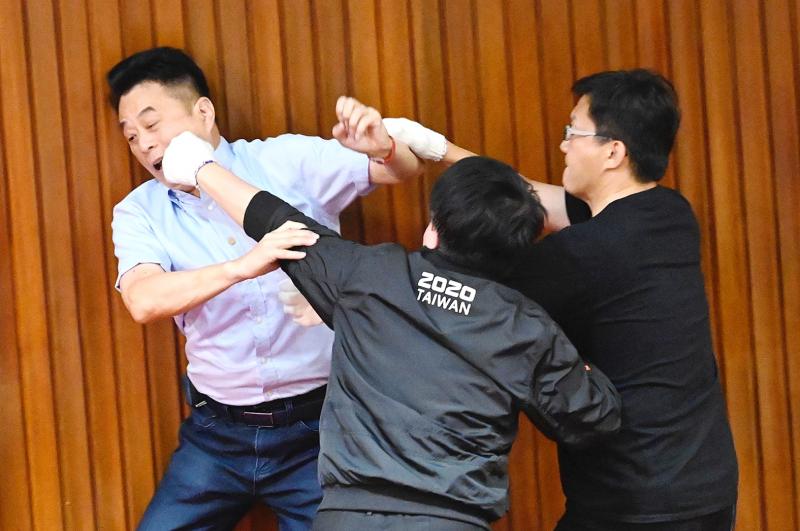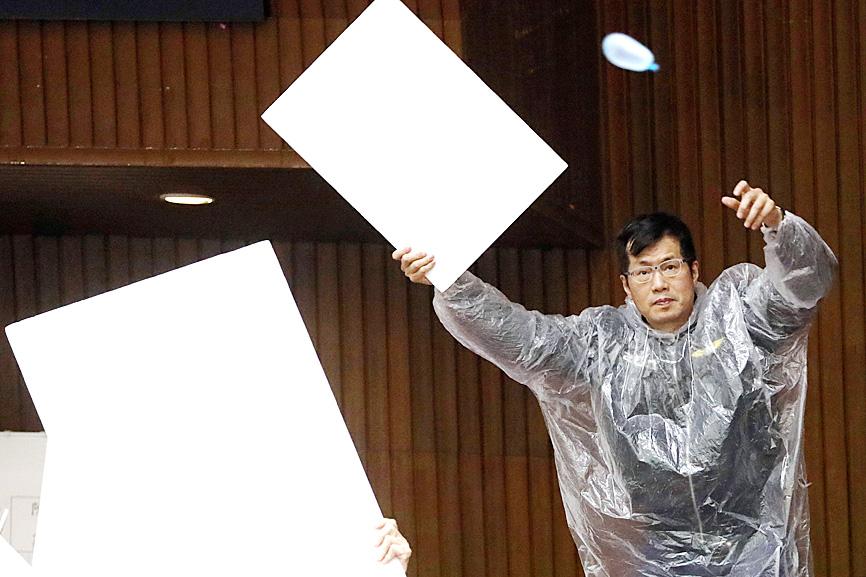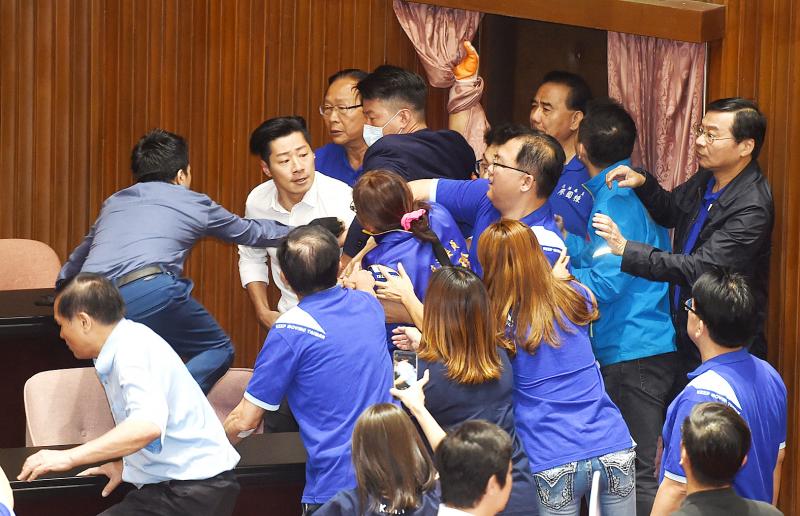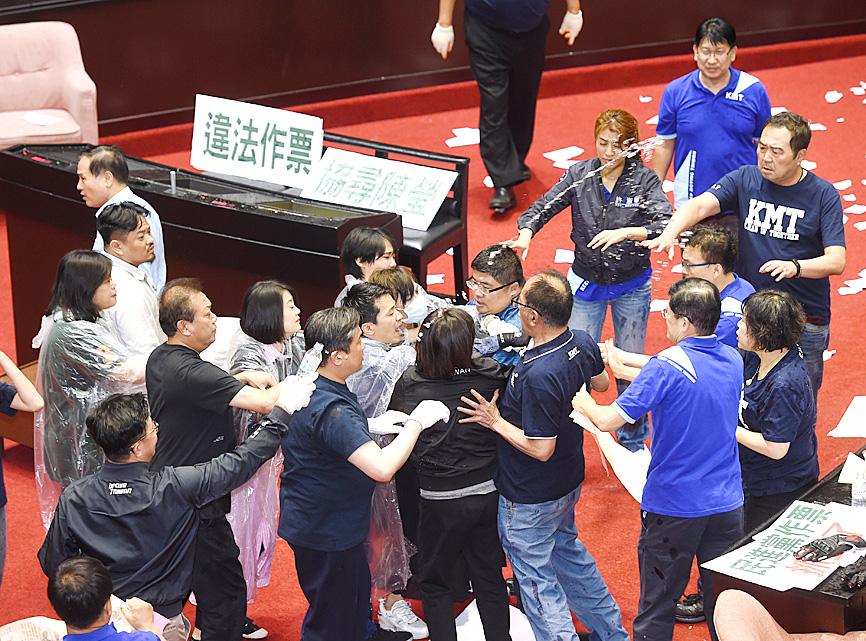Amid chaotic scenes, former Presidential Office secretary-general Chen Chu (陳菊) was yesterday approved as Control Yuan president, despite Chinese Nationalist Party (KMT) legislators attempting to disrupt the vote.
After Legislative Speaker You Si-kun (游錫堃) announced the start of a vote on the president’s Control Yuan nominees at the Legislative Yuan in Taipei, KMT legislators pushed over the two voting booths set up in the main chamber.
The move triggered a melee, but that did not stop DPP legislators from voting to approve the nominees, while KMT legislators attempted to obstruct the proceedings.

Photo: Sam Yeh, AFP
KMT caucus whip Lin Wei-chou (林為洲) said that there had been wrongdoing in Thursday’s vote on a motion that marked the end of a review of the nominees and set the rules for yesterday’s vote.
DPP Legislator Chen Ying (陳瑩) was at a TV station recording a political talk show when You put the motion to a vote, but her name lit up on a screen showing who had voted, indicating that someone else had voted for her, Lin said.
The result should have been annulled just as an election result would be voided if a candidate was found to have bought votes, he said.

Photo: Ann Wang, Reuters
After briefly leaving the main chamber, KMT legislators returned at 11:42am, just 18 minutes before the vote was scheduled to end, and demanded that they be handed ballots.
Legislative Yuan staffers provided a box for KMT legislators to cast their ballots, but they were determined to cast them on the opposite side of the chamber, which was guarded by DPP legislators.
The move alarmed the DPP legislators, who attempted to block their KMT counterparts, triggering scuffles.

Photo: Fang Pin-chao, Taipei Times
KMT lawmakers claimed that the bottom-right corner of every ballot had been cut out and that the vote was being rigged, while demanding that a booth be set up so that they could vote.
With just three minutes left before the vote ended, staffers scrambled to provide a voting booth, but it was set up too late for the KMT legislators to use.
When You ordered that the count begin, it was met with protests from KMT legislators, who threw balloons filled with water at the speaker’s rostrum, while DPP legislators surrounded You and shielded him with placards.

Photo: Fang Pin-chao, Taipei Times
Chen Chu’s nomination was approved 65-3, with two spoiled votes.
The 26 nominees for Control Yuan members were also approved, including Vice Minister of Health and Welfare Su Li-chung (蘇麗瓊), Ill-gotten Party Assets Settlement Committee Deputy Chairwoman Shih Chin-fang (施錦芳), former vice minister of education Fan Sun-lu (范巽綠), former DPP legislator Yeh Yi-jin (葉宜津), former Taiwan Solidarity Union legislator Lai Chen-chang (賴振昌), former Taipei deputy mayor Chen Chin-jun (陳景峻) and former Garden of Hope executive director Chi Hui-jung (紀惠容).
The result should have been voided as KMT legislators had not finished voting, Lin said, adding that the KMT caucus would refuse to acknowledge the result.
When the DPP was in opposition, its legislators stalled votes on nominees by each taking 30 minutes to vote, but when the KMT tried to employ a similar tactic the DPP denied the party its right to vote, he said.
The legislative speaker had rigged a vote for Chen Chu, KMT Chairman Johnny Chiang (江啟臣) said, adding that it was a “scandal” for a democratic nation.
You has been hailed as a pioneer of democracy, but he has trampled on democratic values by breaching legislative procedure, he said.
Chiang questioned whether the DPP intends to approach all legislative votes and reviews in the same forcible manner, warning the DPP that it would feel the wrath of the people if it continues to ignore the opinions of opposition parties.
The Legislative Yuan Secretariat later yesterday said that an investigation had found that Chen Ying’s electronic voting card had been inserted in DPP Legislator Chang Hung-lu’s (張宏陸) slot in Thursday’s vote, and that consequently Chang’s “yes” vote had not been recorded.
The mistake was caused by the chaotic scenes in the chamber, which caused some legislators to take the wrong card, the secretariat said, adding that the mistake did not change the number of ballots cast by the DPP caucus or the outcome of the vote.

ACTION PLAN: Taiwan would expand procurement from the US and encourage more companies to invest in the US to deepen bilateral cooperation, Lai said The government would not impose reciprocal tariffs in retaliation against US levies, President William Lai (賴清德) said yesterday, as he announced five strategies to address the issue, including pledging to increase Taiwanese companies’ investments in the US. Lai has in the past few days met with administrative and national security officials, as well as representatives from various industries, to explore countermeasures after US President Donald Trump on Wednesday last week announced a 32 percent duty on Taiwanese imports. In a video released yesterday evening, Lai said that Taiwan would not retaliate against the US with higher tariffs and Taiwanese companies’ commitments to

‘SPECIAL CHANNEL’: Taipei’s most important tasks are to stabilize industries affected by Trump’s trade tariffs and keep negotiations with Washington open, a source said National Security Council Secretary-General Joseph Wu (吳釗燮) arrived in the US for talks with US President Donald Trump’s administration, a source familiar with the matter said on Friday. Wu was leading a delegation for a meeting known as the “special channel,” the Financial Times reported earlier. It marked Trump’s first use of the channel since returning to the White House on Jan. 20. Citing a source familiar with the matter, the Financial Times reported that Minister of Foreign Affairs Lin Chia-lung (林佳龍) was also a part of the delegation. The visit came days after China concluded war games around Taiwan and amid Trump’s

Intelligence agents have recorded 510,000 instances of “controversial information” being spread online by the Chinese Communist Party (CCP) so far this year, the National Security Bureau (NSB) said in a report yesterday, as it warned of artificial intelligence (AI) being employed to generate destabilizing misinformation. The bureau submitted a written report to the Legislative Yuan in preparation for National Security Bureau Director-General Tsai Ming-yen’s (蔡明彥) appearance before the Foreign Affairs and National Defense Committee today. The CCP has been using cognitive warfare to divide Taiwanese society by commenting on controversial issues such as Taiwan Semiconductor Manufacturing Co’s (TSMC, 台積電) investments in the

HELPING HAND: The steering committee of the National Stabilization Fund is expected to hold a meeting to discuss how and when to utilize the fund to help buffer the sell-off The TAIEX plunged 2,065.87 points, or 9.7 percent, to close at 19,232.35 yesterday, the highest single-day percentage loss on record, as investors braced for US President Donald Trump’s tariffs after an extended holiday weekend. Amid the pessimistic atmosphere, 945 listed companies led by large-cap stocks — including Taiwan Semiconductor Manufacturing Co (TSMC, 台積電), Hon Hai Precision Industry Co (鴻海精密) and Largan Precision Co (大立光) — fell by the daily maximum of 10 percent at the close, Taiwan Stock Exchange data showed. The number of listed companies ending limit-down set a new record, the exchange said. The TAIEX plunged by daily maxiumu in just